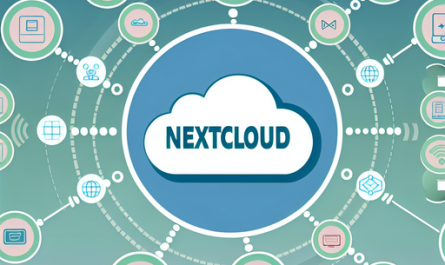Nextcloud and Zoho Bigin: A Perfect CRM Solution
In the ever-evolving world of businesses, efficient customer relationship management (CRM) is a cornerstone for success. Tools like Nextcloud and Zoho Bigin offer unmatched capabilities, and their integration can be the game-changer your business needs. This article delves into the benefits, features, and steps to integrate Nextcloud with Zoho Bigin for an optimized workflow. Read on to find out why this combination is perfect for your CRM needs.
What is Nextcloud?
Nextcloud is an open-source, self-hosted file sync and share platform that allows users to create and manage their own private cloud storage services. It provides robust security, file sharing, and collaboration features. With Nextcloud, you can effortlessly share files, calendars, and contacts while maintaining full control of your data.
Get Nextcloud with 1 TB of storage for just up to €3.99 per month.
Try it now for one month free and risk-free.
Key Features of Nextcloud
- Data Security: End-to-end encryption guarantees that your data remains secure and private.
- File Sync and Share: Seamlessly sync and share files across various devices.
- Collaboration Tools: Integrated tools for team collaboration, such as calendar, contacts, and chat.
- Customization: A plethora of apps and extensions to customize Nextcloud according to your needs.
- Privacy Control: Full control over your data with self-hosting capabilities.
What is Zoho Bigin?
Zoho Bigin is a pipeline-focused CRM solution designed for small to medium-sized businesses. It offers essential CRM features such as contact management, pipeline management, and workflow automation, all in an easy-to-use interface. Zoho Bigin is particularly popular among businesses looking to manage their leads and deals more efficiently without the complexity of larger CRM systems.
Key Features of Zoho Bigin
- Pipeline Management: Visualize and manage your sales pipeline effectively.
- Contact Management: Maintain a detailed database of customers and leads.
- Workflow Automation: Automate repetitive tasks to save time and reduce errors.
- Email Integration: Connect your email accounts for seamless communication.
- Reports and Analytics: Generate insightful reports to monitor your sales performance.
Why Integrate Nextcloud with Zoho Bigin?
Integrating Nextcloud with Zoho Bigin brings together the powerful functionalities of both platforms to create a seamless CRM solution. Here are some compelling reasons to consider this integration:
Enhanced Data Management
With Nextcloud, you can store and manage your customer data securely. By integrating Zoho Bigin, you can directly attach important documents and files to specific deals or contacts, making your CRM data management more efficient.
Improved Collaboration
Nextcloud’s collaboration tools like shared calendars, contacts, and chat rooms can enhance team productivity. When connected to Zoho Bigin, it allows your sales and customer service teams to work together more effectively by having all necessary information in one place.
Streamlined Workflows
Zoho Bigin’s workflow automation combined with Nextcloud’s file management simplifies processes like document sharing, contract management, and customer communication, ensuring that tasks are completed faster and with fewer errors.
How to Integrate Nextcloud with Zoho Bigin
Integrating Nextcloud with Zoho Bigin is a straightforward process. Follow these steps to set up the integration:
Step 1: Set Up Nextcloud
If you haven’t already, set up your Nextcloud server. You can host it on your server or choose a hosting provider that offers Nextcloud services. Once set up, create your user accounts and configure the necessary permissions.
Step 2: Install the Zoho Bigin App
Next, log in to your Zoho Bigin account. Navigate to the “Marketplace” section and search for the Nextcloud app. Install the app and follow the installation prompts.
Step 3: Configure Integration Settings
After installing the Zoho Bigin app, go to the settings of the app. You will need to provide your Nextcloud server details and authentication credentials to establish a connection. Follow the prompts to complete the configuration.
Step 4: Sync Data
Once the configuration is done, you can start syncing data between Nextcloud and Zoho Bigin. You can choose which data to sync, such as contacts, files, or calendars.
Practical Use Cases
The integration of Nextcloud with Zoho Bigin has a multitude of practical applications. Here are some scenarios where this integration can make a significant impact:
Document Management
Sales teams can upload, store, and attach documents directly to deals in Zoho Bigin through Nextcloud. This eliminates the need for separate file storage solutions and ensures that all documents are easily accessible.
Team Collaboration
By sharing calendars and contact lists via Nextcloud, teams can stay updated on meetings, deadlines, and contact details, leading to improved coordination and productivity within Zoho Bigin.
Customer Service
Support teams can use Nextcloud to store customer support documents, FAQs, and manuals securely. They can then easily share these resources internally or with customers, enhancing the quality of support provided.
Security and Privacy Considerations
One of the main advantages of using Nextcloud is its focus on security and privacy. Here’s how it ensures your data remains safe:
End-to-End Encryption
Nextcloud offers end-to-end encryption, ensuring that your data is encrypted during transfer and storage. This level of security is crucial when handling sensitive customer information through Zoho Bigin.
Access Control
Nextcloud’s robust access control features allow you to define who can access specific data. This is especially useful in CRM scenarios where sensitive customer data is involved, ensuring that only authorized personnel have access.
Audit Logs
Nextcloud provides detailed audit logs, which can track and monitor all activities within your cloud storage. These logs are beneficial for compliance and security purposes, providing a complete record of data access and modifications.
Cost-Efficiency
Integrating Nextcloud with Zoho Bigin can also be cost-effective. Here’s how:
Reduced Software Costs
Nextcloud is an open-source platform, meaning you can deploy it without licensing fees. Zoho Bigin offers competitive pricing plans, making it a great choice for small to medium-sized businesses looking for an affordable CRM solution.
Lower Infrastructure Costs
By using self-hosted Nextcloud, you can reduce dependence on expensive third-party cloud storage providers. This can lead to significant savings in the long run.
Case Studies
To better understand the benefits of integrating Nextcloud with Zoho Bigin, let’s look at a couple of real-world examples:
Case Study 1: Small E-Commerce Business
A small e-commerce business integrated Nextcloud with Zoho Bigin to streamline their order management process. By syncing customer data and order details between the two platforms, they enhanced their ability to manage customer inquiries and process orders more efficiently. The integration also allowed them to securely share product documents and marketing materials within their team.
Case Study 2: Marketing Agency
A marketing agency used the integration to manage their client relationships and project documents. They stored all project contracts, design files, and communication logs in Nextcloud, linking them to client profiles in Zoho Bigin. This setup improved their ability to track project status, manage client expectations, and meet deadlines.
Conclusion
Integrating Nextcloud with Zoho Bigin provides a powerful solution for businesses aiming to enhance their CRM capabilities while ensuring data security and collaboration efficiency. From seamless data management to improved team collaboration and cost-efficiency, the benefits are manifold. By following the integration steps outlined in this article, you can unlock the full potential of both platforms and drive your business success to new heights.
If you have any questions or need further assistance with the integration, feel free to reach out via the comments section below. We’d love to hear about your experiences and how this integration has benefited your business!


